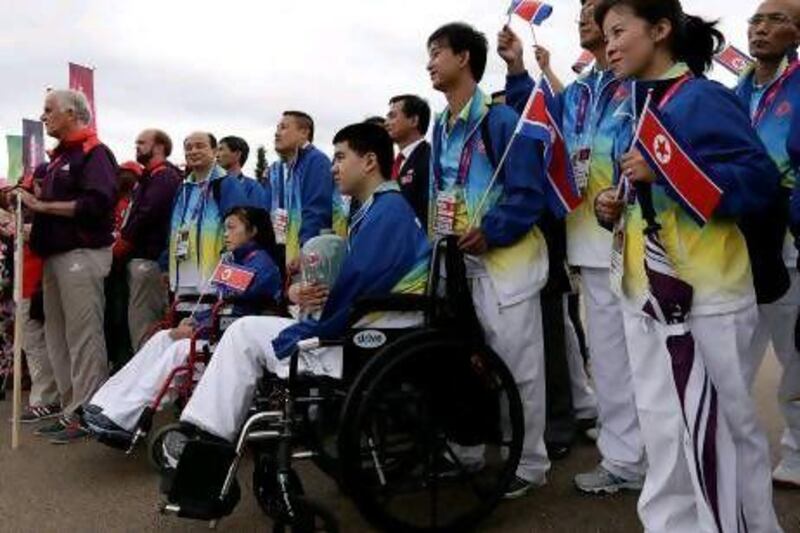North Korea, long accused of shunting its disabled residents off to isolated detention camps, will take part for the first time this year in the Paralympics, which opens today in London.
The country's sole competitor is a 16-year-old swimmer whose training only began in April. Yet his participation offers inspiration to others involved in North Korea's nascent disabled sports programmes, says Li Pun-hui, a former table tennis star who has become her country's leading advocate for disabled athletes.
"Healthy or disabled, if you have the will to succeed, there is no obstacle in your way," Li said.
Earlier this year, Li's work helped gain North Korea provisional membership in the International Paralympic Committee. But the clearance to participate came too late to qualify for most events.
The exception was swimming. Rim Ju-song, who actually lives in Beijing and lost an arm and leg in an accident, became his country's only hope. The problem: he could not really swim.
The first training session was a disaster. He sank "like a rock", recalled Kim Sung-chol of the North Korean Paralympic Committee. Nevertheless, he soon learnt the crawl stroke and in May, Rim and his coaches boarded a plane for Berlin and his first international competition.
Only upon arrival did the North Koreans learn that Rim would need a second stroke to compete. He spent the next two weeks learning the breaststroke. Rim finished last in one event and was disqualified in the other, but that was good enough for a wild-card slot in the Paralympics, where on September 4 he will compete in the 50 metre freestyle.
Kim Sung-chol, the North Korean team doctor, said: "He has been training very hard but I don't know what will happen. But the main thing is that we are participating to experience the Games, then next time, if we can improve further, then maybe at the next Paralympics [in Rio de Janeiro in 2016] we can be involved more."
His performance will be watched closely back in North Korea, where sports play a major role in life. From the streets of the capital to the dusty fields of the countryside, youngsters are constantly kicking around footballs, and there is a basketball hoop in nearly every schoolyard.
From an early age, promising athletes are plucked for rigorous training, and those who win medals at international tournaments are welcomed home as heroes.
One of those heroes was Li, who became her country's darling after teaming up with a South Korean player in 1991 to beat the seemingly indomitable Chinese and win the team gold at the World Table Tennis Championships. It was the first time players from the enemy Koreas competed together.
After her career ended and her now 15-year-old son was born with cerebral palsy, Li dedicated her life to bringing the disabled out of the shadows and onto the playing fields.
In 2010, she organised a table tennis tournament that was covered by state media - the first time many North Koreans saw the disabled on television.
"Caring for my son, I've felt that people with disabilities often feel despair," she said. "They feel uncomfortable around other people, ashamed of their disabilities, and purposeless."
This may be especially true in North Korea. The country has some 1.8 million disabled people, about 7.5 per cent of the population, according to the Green Tree Charity Foundation in South Korea, which bases its estimate on figures provided by the North Korean government.
Defectors have reported in the past that the disabled were housed at group homes and kept out of the showcase capital of Pyongyang and other major cities, according to the South Korean government and the United Nations special rapporteur for human rights.
In 2003, the country passed a law promising free medical care and special education, and in 2009 Pyongyang assured the UN its disabled were receiving proper care and schooling.
But Kim Kyung-hwa, the manager of the Green Tree foundation's planning team, says the country can barely feed its people, much less provide special care for the disabled.
Green Tree sends food and supplies to North Korea's disabled, as well as sports equipment to Li and her group of disabled athletes.
The foundation and other donors have helped provide the ping pong tables, barbells and other equipment that fill a Pyongyang recreation centre that serves as a training facility for disabled athletes.
When journalists visited the Taeddonggang Cultural Center for the Disabled in June, a young woman in a wheelchair was thwacking a ping pong ball fired at her by a coach while a boy fiddled with his prosthetic leg while awaiting his turn.
Though these two young athletes missed the chance to compete in London, Li sees her country's first trip to the Games as a "first step" toward developing a disabled sports culture in North Korea.
"People can communicate through sports," she said, "and learn to feel comfortable around one another through sports."
sports@thenational.ae
Follow us
[ @SprtNationalUAE ]





